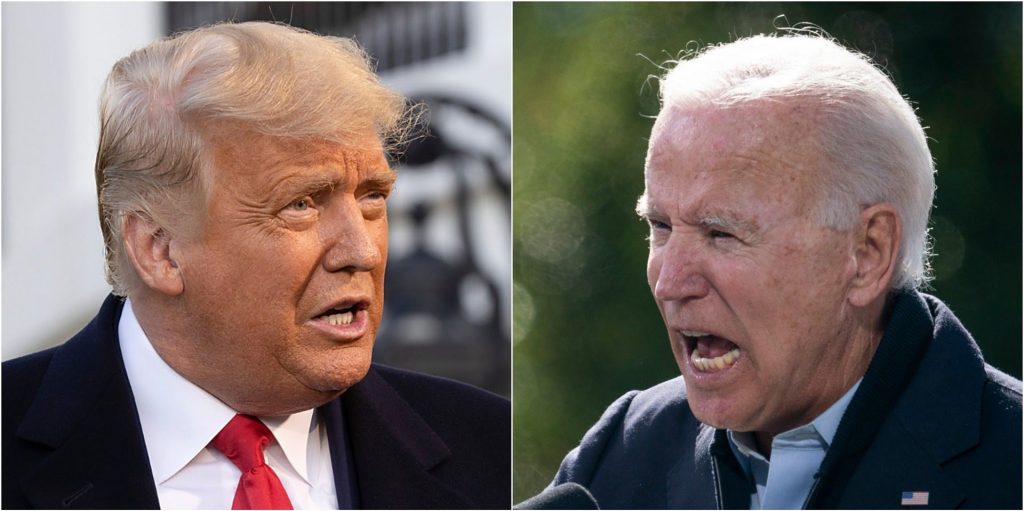A week after losing the US election, President Donald Trump remained shut up in the White House on Tuesday, pushing an alternate reality that he is about to win and blocking Democrat Joe Biden’s ability to prepare the transition.
“WE WILL WIN!” the Republican president tweeted, adding: “WE ARE MAKING BIG PROGRESS. RESULTS START TO COME IN NEXT WEEK. MAKE AMERICA GREAT AGAIN!”
The message referred to Trump’s unprecedented decision for a US president to dispute a lost election, refusing to concede to his opponent and mounting a string of flimsy court challenges in states where Biden won.
Several suits have been thrown out almost immediately and the remainder clearly have no chance of overturning Biden’s slim but convincing victories in multiple states.
Trump’s attempt to hold on to power has become all consuming for the man who often makes a point of publicly mocking rivals as “losers.”
Since Election Day on November 3 he has made few public appearances and seems to have all but shelved normal presidential duties.
His only known activities outside the White House have been to play golf twice over the weekend, after the results came in.
Normally routine secret presidential intelligence briefings have been off the daily schedule. He has made no mention of the dramatic rebound in the Covid-19 pandemic across the country.
And his once near daily press conferences, interviews with Fox News or impromptu question-and-answer sessions with White House journalists have dried up.
In place of that, Trump has spent much of his time tweeting, mostly about what he claims is the stolen election. Sometimes he refers to supportive comments by the right-wing hosts on Fox News, tweeting quotes from shows across the network’s daily schedule.
Trump’s only significant presidential action has been the abrupt firing of the defense secretary Mark Esper on Monday, which he announced on Twitter.
Transition blocked
Exactly four years ago on Tuesday, Trump had just won his surprise victory against Hillary Clinton and toured the White House for the first time as a guest of the outgoing Democratic incumbent Barack Obama.
That courtesy to presidents-elect is an old tradition, highlighting the nation’s near sacred respect for the peaceful transfer of power.
Trump, who came into office vowing to upend institutions and what he called “the deep state,” is now shattering another custom.
Not only has he failed to invite Biden for a chat in the Oval Office, he is blocking the Democrat from access to facilities, funding and expertise that usually comes in a ready made package to help the incoming leader.
Release of this transition aid is controlled by the General Services Administration head Emily Murphy, who was appointed by Trump.
Biden, who won with a record number of votes but acknowledges that nearly half the electorate nevertheless backed Trump, is apparently choosing to ignore the chaos.
Rarely even mentioning Trump, Biden has set up a coronavirus task force and on Tuesday was delivering his latest policy speech – this time on the fate of the Obamacare health care plan which Trump is asking the Supreme Court to dismantle.
Republicans back Trump
Washington is buzzing with speculation over who, if anyone, in Trump’s inner circle will finally persuade him to go.
Former President George W. Bush, the only living Republican ex-president, congratulated Biden on his victory, but he is an outlier in a party dominated by the still hugely popular Trump.
On Monday, the Republican leader in Congress, Senator Mitch McConnell, said Trump was “100 percent within his rights” to challenge the election in court.
How long that level of support will last – or even how long Trump will want to keep clinging to the presidency – is unclear.
None of the lawsuits appears to have the potential to change the result of votes and even a planned recount in Georgia, or anywhere else, would be unlikely to change the fundamental math.
But Trump added a potential new weapon to his crusade against the results on Monday when his attorney general, Bill Barr, agreed to authorise probes into “specific allegations” of fraud.
Barr added a caveat that “specious, speculative, fanciful or far-fetched claims should not be a basis for initiating federal inquiries”.
However, Barr’s unusual intervention in the dispute prompted worries that Trump will go even further in his efforts. The Justice Department’s top election crimes prosecutor, Richard Pilger, resigned in protest.
Biden’s inauguration is on 20 January, 71 days away

